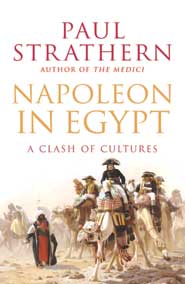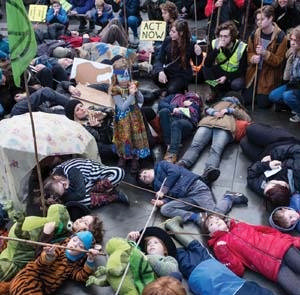After the last Crusaders withdrew, no European army ventured into Egypt for almost 500 years. But in the summer of 1798 the young Napoleon, still only 28, launched what may have been the biggest seaborne invasion since Xerxes’ Persian fleet, and set out for Egypt with 335 ships, 1,200 horses, 171 field guns and 35,000 troops. Evading Nelson’s warships, he landed a few weeks later and began one of the most bizarre, brief, ill-fated and momentous colonial adventures of all time. Egypt, and arguably the whole Muslim world, still bears the marks.
 No one quite knows why the ambitious young Corsican took it into his head to set off for the Orient. Maybe he dreamed of following in the footsteps of Alexander the Great. Maybe his vaulting ambition was constrained by the revolutionary turmoil in France and the incompetence of the ruling Directory. Maybe he was influenced by the tales of recent explorers and believed he could bring the civilisation of France to the benighted Muslim world. In any case, having declared that “Europe is a molehill. Everything here is worn out. My glory is slipping from my grasp. Tiny Europe has not enough to offer,” he built a huge fleet, handpicked his officers, gathered an army of eager soldiers already dazzled by his earlier Italian campaign, persuaded an eclectic assortment of scholars, artists, botanists, chemists, mineralogists, pharmacists, printers, surgeons and zoologists to join him, picked up a copy of the Koran to read on the voyage and on 19 May set sail from Toulon.
No one quite knows why the ambitious young Corsican took it into his head to set off for the Orient. Maybe he dreamed of following in the footsteps of Alexander the Great. Maybe his vaulting ambition was constrained by the revolutionary turmoil in France and the incompetence of the ruling Directory. Maybe he was influenced by the tales of recent explorers and believed he could bring the civilisation of France to the benighted Muslim world. In any case, having declared that “Europe is a molehill. Everything here is worn out. My glory is slipping from my grasp. Tiny Europe has not enough to offer,” he built a huge fleet, handpicked his officers, gathered an army of eager soldiers already dazzled by his earlier Italian campaign, persuaded an eclectic assortment of scholars, artists, botanists, chemists, mineralogists, pharmacists, printers, surgeons and zoologists to join him, picked up a copy of the Koran to read on the voyage and on 19 May set sail from Toulon.
All went well at first. Napoleon made first for Malta, where in a classic Blitzkrieg he overwhelmed the doddery Knights, freed the slaves, abolished feudalism, changed the constitution, scooped up seven million francs in treasure and set off again, with Nelson vainly searching the Mediterranean, frantically trying to work out where his enemy was going and why. He arrived off the coast of Egypt as deluded in his diplomacy as he was in his expectations, insisting that he was still a friend of the Sultan in Istanbul, the nominal chief, and had come to rid Egypt of its corrupt Mameluke rulers. But things quickly began to go awry. The landing proved chaotic and the strategy confused. Napoleon expected to be greeted as a friend, issuing grandiose declarations promising to respect Islam and ordering exemplary behaviour by his men, but the bemused Egyptians and the cunning Bedouin were unmoved and soon began to take pot shots.
The French reverted to old-fashioned warfare. The Mameluke rulers, Murad and Ibrahim Bey, fled and Alexandria was quickly taken. But the march to Cairo was sheer hell: terrible heat, mosquitoes, no water, little food or fodder, harassment by Bedouin and widespread dysentery. Finally, his Army of the Orient reached the outskirts of Cairo, where at last the Mamelukes rallied and fought. The Battle of the Pyramids, as Napoleon insisted it be called, was a French triumph: the Egyptians, utterly unused to modern warfare, were cut down and fled. The gateway to Cairo was open, and Napoleon marched in.
Paul Strathern tells the story at a cracking pace. He goes back to the original sources, quotes from documents, letters, archives and Napoleon himself, and brings to life the fakirs and the filth of Cairo, the heat, the cafés, the vermin and the stoic, often other-worldly scholarship of the French savants, whose determined attempts to document the unknown are probably the most enduring legacy of the entire expedition. It is a tale often told before but little known outside France. Strathern brings out the expedition’s laughable naiveté by contrasting the lofty ideals and deluded ambitions of the French with the squalor, conservatism, ignorance and suspicion of the Egyptians, who had no idea who these foreign adventurers were and what they wanted. But though the French set about a wholesale reorganisation of Egyptian society, taxes, education, laws and urban planning, they were constantly baffled by what they found. Islam was utterly unaccommodating to the invaders. Napoleon insisted on taking part in Muslim celebrations of the birth of the Prophet, and declared his army was ready to convert wholesale to Islam; but when he found that the muftis would agree only if all the soldiers were circumcised and swore to abstain from alcohol, he saw this was somewhat impractical. Equally misguided was the ludicrous proposal to throw a grand ball to bring together French and Egyptian high society, to which not a single Egyptian woman turned up. Napoleon dreamed of importing Paris society and culture wholesale; nothing could be less appropriate.
Strathern has poignant anecdotes of the sex-starved soldiers, fascinated by belly-dancers but repulsed by raddled old Egyptian whores. Napoleon’s own fragile marriage with the faithless Josephine was the subject of much gossip. Strathern delves into Napoleon’s complicated sex life (he used to masturbate before a battle to calm himself) and traces the brief affair with the wife of a French officer. But tragedy was fast approaching. Nelson finally found the French fleet at Aboukir Bay and, in a brilliant tactical battle, destroyed it, cutting Napoleon off from news, supplies and reinforcements. From then on, the story is of how the increasingly megalomaniac future emperor staved off defeat, sent his best generals south on futile expeditions to capture the fugitive Mamelukes and in 1799 had to march to Suez and beyond to confront the threat of an Ottoman counter-invasion from Syria.
Napoleon almost succeeded, but plague, shortages and the British blockade gradually wore down the Army of the Orient. Even as his scholars were still documenting, sketching and collecting, Napoleon realised the game was up. Belated news from France warned him that he should hurry home. Appointing his second-in-command, the grizzled old General Klebér, in his place, he abandoned his army, evaded the blockade and fled. “That bugger has deserted us with his breeches full of shit. When we get back to Europe we’ll rub his face in it,” a furious Kléber said. Almost in mockery, Napoleon’s last order was to arrange to send a troupe of comedians out to Egypt – something he thought important for army morale and “to begin to change the habits of the Egyptians.” He was deluded to the last.
Militarily, the expedition was a colossal and expensive blunder. Politically, it was a watershed – for Europe and for a shaken Muslim world. It began a long history of European involvement and rule which did not really end in Egypt until Suez in 1956. It opened the eyes of Europe to an ancient civilisation and exposed Egypt and the Muslim world to the challenge of new ideas, new technology and new colonial powers. For political Islam, 1798 was as shattering as the First Crusade. The repercussions are still being felt. ■
Napoleon in Egypt is published by Jonathan Cape

